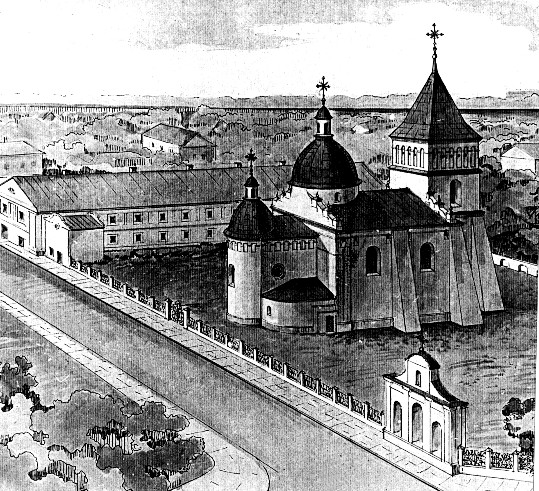Lutsk eparchy
Lutsk eparchy [Луцька епархія; Lutska eparkhiia]. An eparchy in Volhynia, with its see in Lutsk. The earliest mention of the eparchy dates from ca 1326. From 1495 it was known as Lutsk-Ostroh eparchy. In 1595 Bishop Kyrylo Terletsky traveled to Rome to make his confession of faith to the pope and became a leading proponent of the Church Union of Berestia. Orthodox forces continued to battle for control of the eparchy, however, and Ye. Pochapovsky, Terletsky's successor, was forced to relinquish the eparchy to the Orthodox bishop A. Puzyna in 1633. From then the remaining Uniate parishes and several monasteries were administered by the archimandrite of the Zhydychyn Saint Nicholas's Monastery. Orthodox bishops in the 17th century included Dionisii Balaban and Hedeon Sviatopolk-Chetvertynsky. In 1702 Bishop Denys Dionysii Zhabokrytsky led the eparchy back into the Uniate church, but he was arrested by the Russian authorities, and died in prison.
In the 18th century there was only one Orthodox bishop of Lutsk but eight Uniate bishops, including Teodosii Rudnytsky-Liubienitsky and Sylvestr Rudnytsky-Liubienitsky. After the partitions of Poland the territory of the eparchy came under Russian rule. At that time a new Orthodox Volhynia eparchy was created from most of Lutsk-Ostroh eparchy and Volodymyr-Volynskyi eparchy. Several Uniate bishops were appointed to the Lutsk see in the early 19th century, but in 1839 Tsar Nicholas I forcibly liquidated the Uniate church in the Russian Empire, and the Uniate eparchy was dissolved.
During the First World War, Metropolitan Andrei Sheptytsky appointed Yosyf Botsian as the Uniate bishop of Lutsk. After the war, however, the territory again came under Polish rule, and the Polish authorities and Roman Catholic hierarchy, both opposed to the Uniate presence in Volhynia, forced Botsian to relinquish his post in 1924. In 1932 Polikarp Sikorsky was consecrated bishop of Lutsk for the Polish Autocephalous Orthodox church. After the Second World War the Russian Orthodox church created the Volhynia eparchy, which contained Volhynia oblast and Rivne oblast. In 1963–72 Vasyl Velychkovsky was bishop of Lutsk for the underground Ukrainian Catholic church. With the liberalization of religious life in Ukraine in the early 1990s, the renewed Ukrainian Autocephalous Orthodox church established an eparchy in Lutsk.
[This article originally appeared in the Encyclopedia of Ukraine, vol. 5 (1993).]
